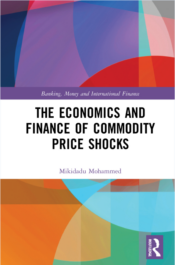 Mikidadu Mohammed, Austin College assistant professor of economics, has written the just-released book The Economics and Finance of Commodity Price Shocks. Published by Taylor & Francis/Routledge, it is now available through Amazon and other major book retailers.
Mikidadu Mohammed, Austin College assistant professor of economics, has written the just-released book The Economics and Finance of Commodity Price Shocks. Published by Taylor & Francis/Routledge, it is now available through Amazon and other major book retailers.
Mohammed, who joined the Austin College faculty in 2017, teaches courses in international finance, macroeconomics, predictive analytics, international business, and international trade theory and policy. His teaching philosophy, he says, is anchored on two key principles: (1) to enhance students’ independence of thought through development of a sound theoretical and methodological foundation and (2) to ignite students’ curiosity and passion for applying economics to solve tangible problems facing society. Mohammed is also the co-director of the annual Austin College – Dallas Federal Reserve Bank Economics Scholars Program.
Before joining the Austin College Economics Department faculty, Mohammed was a teaching associate at the University of Utah in the Department of Economics, an adjunct professor at Westminster College in Utah, and a research analyst at the University of Utah Gardner Policy Institute.
Mohammed said the book came out of his own fascination with how commodity-dependent people’s lives have become—from coffee, milk, flour, rare coins, gold, oil, natural gas, cobalt, nickel, copper, bovines, to fish and grains. “Anytime an unexpected movement in commodity prices occurs, most of us end up paying a dear price at the pump, grocery stores, restaurants, cafés, electronics, and even investments,” Mohammed said. “Yet the causes of the movements in commodity prices remain a mystery to us all. In this book, I take readers on a journey to uncover the underlying causes of large price movements in commodity markets. I also expose readers to a variety of price forecasting techniques to make better investment decisions.”
The publisher’s notes say that the book “provides insights into modeling and forecasting the underlying causes of global commodity price shocks.” The publisher indicates three objectives behind the book:
- To provide frameworks for documenting the frequency and intensity of commodity price shocks;
- To evaluate existing approaches used for forecasting large movements in future commodity prices; and
- To cover a wide range and aspects of global commodities, including currencies, rare-hard-lustrous transition metals, agricultural, energy, and the stock market.
“The book is also timely because it helps the reader understand how COVID-induced demand and supply shocks led to commodity price increases, shortages, and inflation,” the publisher says.
Mohammed earned his bachelor’s degree at Kwame Nkrumah University of Science and Technology. He earned a master’s degree at New Mexico State University and a Ph.D. at the University of Utah.
Austin College, a private national liberal arts college located north of Dallas in Sherman, Texas, has earned a reputation for excellence in academic preparation, global awareness, pre-professional foundations, leadership development, committed faculty, and hands-on, adventurous learning opportunities. One of 40 schools profiled in Loren Pope’s influential book Colleges That Change Lives, Austin College boasts a welcoming community that embraces diversity and individuality, with more than 50 percent of students identifying as persons of color. The residential student body of approximately 1,300 students and an expert faculty of more than 100 educators allow a 12:1 student-faculty ratio and personalized attention. Related by covenant to the Presbyterian Church (USA), Austin College cultivates an inclusive atmosphere that supports students’ faith journeys regardless of religious tradition. The College, founded in 1849, is the oldest institution of higher education in Texas operating under original name and charter.



